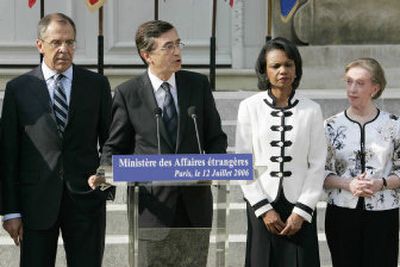Iran warned to halt nuclear program

PARIS – The United States and five other world powers gave Iran a stern ultimatum Wednesday, announcing they would seek a United Nations Security Council resolution authorizing sanctions against Tehran unless the regime suspends its nuclear program.
The announcement came after Secretary of State Condoleezza Rice met here with top diplomats from France, Britain, China and Russia, all permanent members of the Security Council, along with envoys from Germany and the European Union.
Despite past Russian and Chinese reluctance to take a hard line with Iran, the diplomats said in a joint statement that they had “no choice” because Iran has not responded to an offer of incentives in exchange for stopping development of the nuclear program.
“The Iranians have given no indication at all that they are ready to engage seriously on the substance of our proposals,” said French Foreign Minister Philippe Douste-Blazy, reading the statement. “Iran has failed to take the steps needed to allow negotiations to begin. … We express profound disappointment over this situation.”
The nations involved will begin work at the U.N. next week drafting a resolution that sets a deadline for Iran to suspend uranium enrichment activities or face consequences, diplomats said.
Emyr Jones Parry, the British ambassador to the U.N., said in New York that the Security Council would work this week on revising a resolution that had been introduced in May, and then formally present it next week. The resolution was suspended two months ago to allow Iran time to respond to the incentives package.
Just how punitive the potential sanctions might be, given past Russian and Chinese reluctance to punish Iran because of strong commercial ties to the regime, will not be determined until after the deadline established in the resolution, diplomats said.
The foreign ministers’ statement in Paris made it clear that Iran can avoid punishment and return to talks with European negotiators by complying with demands to stop enriching uranium.
“The offer made in Vienna is still on the table,” Undersecretary of State Nicholas Burns told journalists after the meeting.
The foreign ministers made no mention of potential military action against Tehran. Their statement warned of “measures under Article 41 and Chapter VII of the U.N. Charter,” a section that allows the Security Council to impose economic and other types of sanctions.
Iran did not respond immediately Wednesday evening. Iranian leaders say they are enriching uranium for civilian uses and deny accusations that they are trying to build a nuclear weapon.
Iranian diplomats have said they will respond by Aug. 22 to the proposed package of political, economic and nuclear incentives, which among other things proposes U.S. and European assistance in developing civilian nuclear technology.
Diplomats from France, Germany, Britain and the European Union have taken the lead in the nuclear talks with Tehran. Javier Solana, the EU’s foreign envoy, reported to his counterparts here Wednesday that three negotiating sessions since June 6 had produced no progress. Solana had a tense discussion Tuesday in Brussels with Ali Larajani, the chief Iranian negotiator, who declared afterward that Iran refused to be rushed.